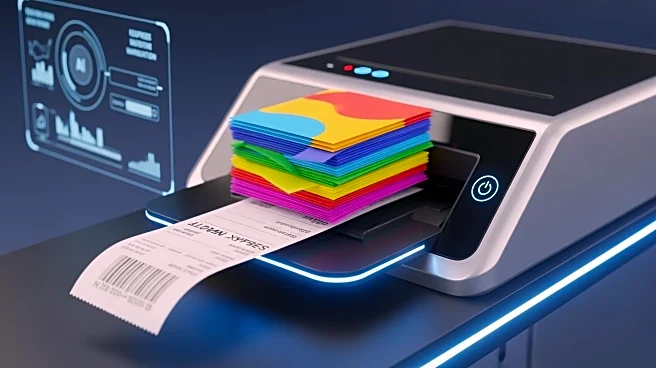What's Happening?
Businesses are facing a new challenge as employees increasingly use artificial intelligence to create fake expense receipts. Recent advancements in image-generation models by AI groups such as OpenAI and
Google have led to a surge in AI-generated receipts being submitted within companies. According to expense software provider AppZen, these fake AI receipts accounted for approximately 14% of fraudulent documents submitted in September, a significant increase from none last year. Fintech group Ramp reported that its software flagged over $1 million in fraudulent invoices within 90 days. The rise in falsified receipts has been noted by about 30% of financial professionals surveyed by Medius, an expense management platform. The improved image generation model launched by OpenAI in March has contributed to this increase, making it easier for employees to create convincing fake receipts using simple text instructions to chatbots.
Why It's Important?
The proliferation of AI-generated fake receipts poses a significant threat to businesses, impacting their ability to detect and prevent fraud. As these receipts become increasingly realistic, traditional methods of verification may no longer suffice, potentially leading to financial losses and compromised trust within organizations. The ease of creating fraudulent documents with AI tools highlights the need for enhanced security measures and fraud detection systems. Companies may need to invest in more sophisticated AI-driven compliance checks to counteract this trend. The situation underscores the broader implications of AI technology in business operations, where its misuse can lead to substantial economic and reputational damage.
What's Next?
Businesses are likely to respond by upgrading their fraud detection systems and implementing stricter compliance measures. Expense management platforms may develop more advanced AI-driven tools to identify and flag suspicious activity. Companies might also consider training employees on ethical AI use and the consequences of fraudulent behavior. As AI technology continues to evolve, ongoing vigilance and adaptation will be crucial for businesses to safeguard against emerging threats. Collaboration between AI developers and businesses could lead to the creation of more robust security protocols to prevent misuse of AI-generated content.
Beyond the Headlines
The ethical implications of AI-generated fake receipts extend beyond immediate business concerns. This development raises questions about the responsibility of AI developers in preventing misuse of their technology. It also highlights the need for regulatory frameworks to address the potential for AI to facilitate fraudulent activities. The cultural shift towards reliance on AI tools for various tasks may necessitate a reevaluation of trust and authenticity in digital transactions. Long-term, this could influence how businesses approach AI integration, balancing innovation with security and ethical considerations.










